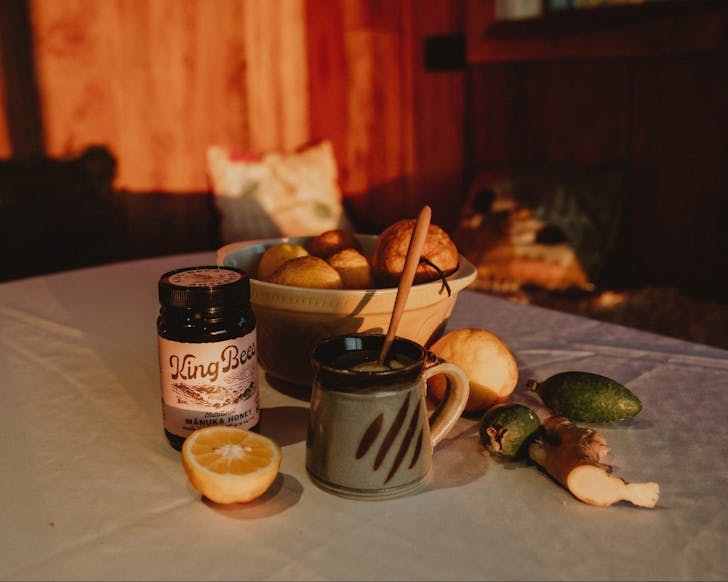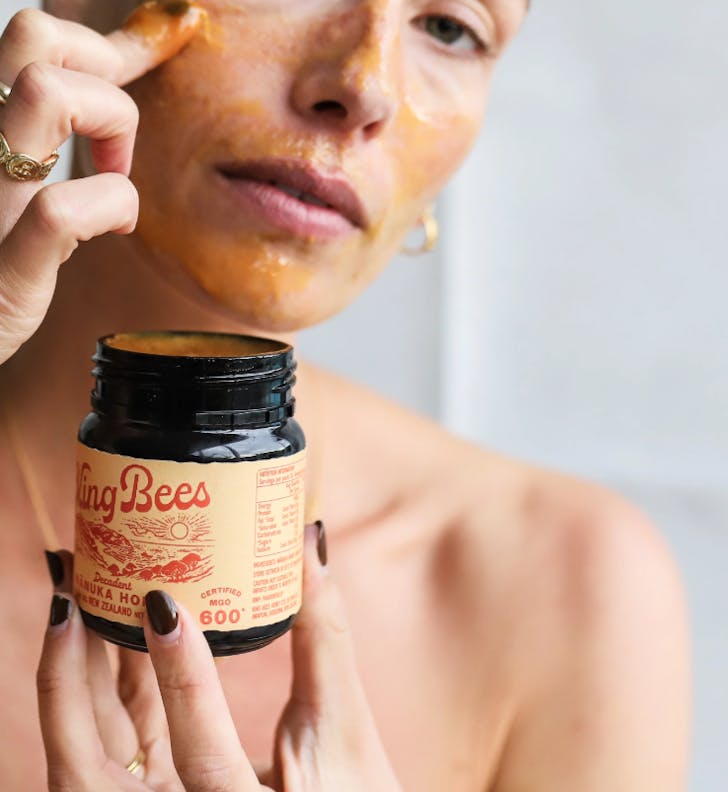From TCM To TikTok: Why Honey Is Asia’s Hottest Health Trend
From soothing sore throats to drizzling over desserts, honey has long been Asia’s go-to natural elixir. Across the region—from China to India, Japan to Singapore—this sticky-sweet staple has been prized for centuries as both food and medicine. It’s a symbol of health, harmony, and indulgence (and one of the few ingredients that tastes as good as it is good for you).
In Singapore, honey is the quiet achiever of everyday wellness. You’ll spot it stirred into kopi, mixed into herbal teas at hawker centres, or featured in post-yoga tonics at cafes. It’s that rare ingredient that bridges old-school wisdom and new-age wellness—your grandma’s cupboard essential and your nutritionist’s latest obsession.
Meet The Queen Bee Behind King Bees
To dig deeper into the buzz, we caught up with Cate King, founder of King Bees in New Zealand which is known for producing small-batch, ethically harvested Manuka and wildflower honey.
Cate’s story starts in the rugged hills of the East Coast, where her family’s hives are surrounded by untouched native bush. “We’re incredibly lucky to have bees foraging in one of the purest environments on earth,” she says. “You can actually taste the land in every jar—it’s wild, floral, and full of life.”
King Bees prides itself on doing things the slow, old-fashioned way. No pasteurisation, no additives, no over-processing. “We treat our honey like winemakers treat their grapes. Each batch tells a story of place, season, and bloom,” Cate adds.
Raw, Real, And Ridiculously Good For You
Cate is quick to point out that not all honey is created equal. “Most supermarket honey has been pasteurised, filtered, and blended, which strips out all the good stuff,” she explains. “Raw honey is the opposite—it’s alive. It still has enzymes, amino acids, natural probiotics, and trace minerals that your body can actually use.”
Beyond sweetness, honey’s superpowers are seriously impressive. It’s naturally antibacterial, antifungal, and anti-inflammatory; it helps heal wounds, supports gut health, and boosts immunity. “People are realising that honey is more than a sugar substitute, it’s functional food,” says Cate. “A spoon a day genuinely makes a difference to how your body feels.”

Image credit: King Bees | Supplied
Why Honey Has Major Wellness Cred In Asia
It’s no wonder Asia has such a soft spot for this liquid gold. In Traditional Chinese Medicine (TCM), honey—known as feng mi (蜂蜜)—has been used for thousands of years to “tonify” the body, nourish the lungs, and harmonise the spleen and stomach. Translation: it helps with dryness, digestion, and fatigue.
From honey chrysanthemum teas to herbal tonics, honey has been quietly working its magic long before wellness influencers made it a hashtag. It’s also a go-to for cooling heatiness aka those times when your body feels off balance after too much fried food or late nights. A spoon of honey in warm water or chrysanthemum tea is the age-old remedy to calm inflammation and bring things back to harmony.
“I think Asia really understands the balance between nature and nourishment,” Cate notes. “Honey sits right in that sweet spot (literally).”
The Manuka Phenomenon
No honey talk is complete without mentioning the world’s most famous jar: Manuka honey. Born in New Zealand, this thick, medicinal variety is now a global superstar, and Asia can’t get enough. Its hero compound, MGO (methylglyoxal), gives it serious antibacterial strength.
“The higher the MGO rating, the stronger the honey’s healing properties,” Cate explains. “At King Bees, we test and label every batch by MGO, so customers know they’re getting genuine, active Manuka.”
In Singapore, Manuka is practically a pantry status symbol, used in everything from morning lemon water to DIY face masks. Cate laughs, “We have customers who treat their jar like skincare, they won’t share it with anyone.”

Image credit: King Bees | Supplied
Honey As Skincare? Bee-lieve It
If you’ve ever Googled ‘natural beauty hacks’, you’ve probably seen honey pop up again and again (and for good reason). Its antimicrobial and humectant properties make it a natural fit for skin health.
“Honey draws moisture into the skin while calming irritation,” Cate explains. “I’ve used it as a cleanser, a mask, even a spot treatment. It’s one of the few beauty ingredients that’s edible, effective, and eco-friendly.”
How To Choose (And Use) The Real Stuff
Shopping for honey can be tricky, especially with so many fake or diluted products out there. Cate’s rule of thumb? Look for labels that say “raw,” “cold-extracted,” or “unfiltered,” and avoid anything that’s crystal clear or suspiciously cheap. “If it looks too perfect, it probably is,” she warns. “Real honey should crystallise naturally over time, that’s how you know it hasn’t been processed.”
When it comes to her own honey habits, Cate keeps it simple. “Every morning, I take a spoonful straight from the jar, it’s like my daily multivitamin,” she says. “I’ll also add a drizzle to oats, smoothies, or lemon water. It’s the easiest wellness ritual you can have.”
The Sweet Sustainability Factor
King Bees is also big on protecting the planet that makes its product possible. Every jar supports ethical beekeeping practices and helps safeguard bee populations across New Zealand. “Bees are the heart of our ecosystem,” Cate says. “Without them, we don’t have fruit, flowers, or food. Supporting real honey means supporting biodiversity.”
The Final Drizzle
Whether it’s bottled in a TCM shop, sourced from a boutique New Zealand brand, or stirred into kopi at your local hawker, honey is Asia’s sweetest obsession for good reason. It’s timeless, versatile, and deeply rooted in centuries of wellness wisdom.
As Cate puts it, “Honey reminds us that nature knows what it’s doing, we just have to listen (and maybe add a little to our tea).”
Looking for more? Check out:
- $5 Eats And Three-Star Stunners: Aussie Chef Dave Pynt’s Singapore In 48 Hours
- Is Thursday The New Friday? Why More Of Us Are Ditching The Weekend To Party Early
- Rising Prices, Same Appetite: How Singaporeans Are Still Eating Out (Smartly)
Main image credit: King Bees | Supplied
